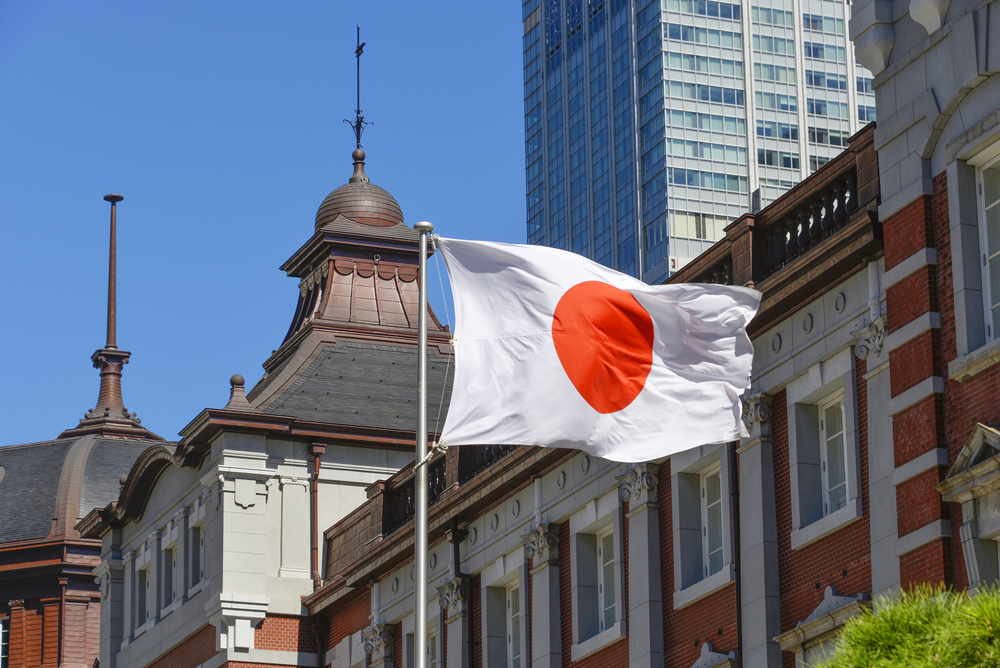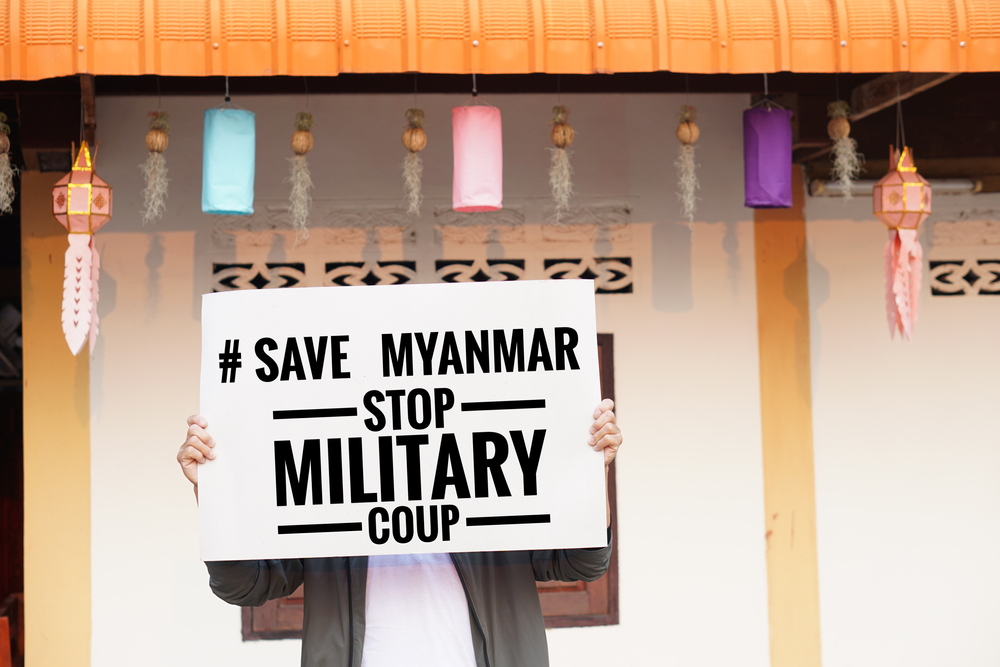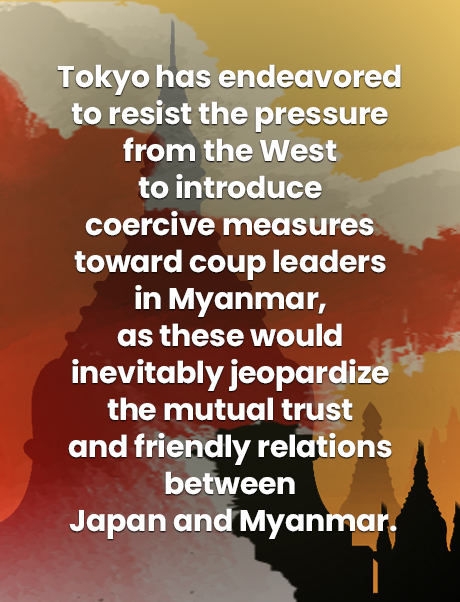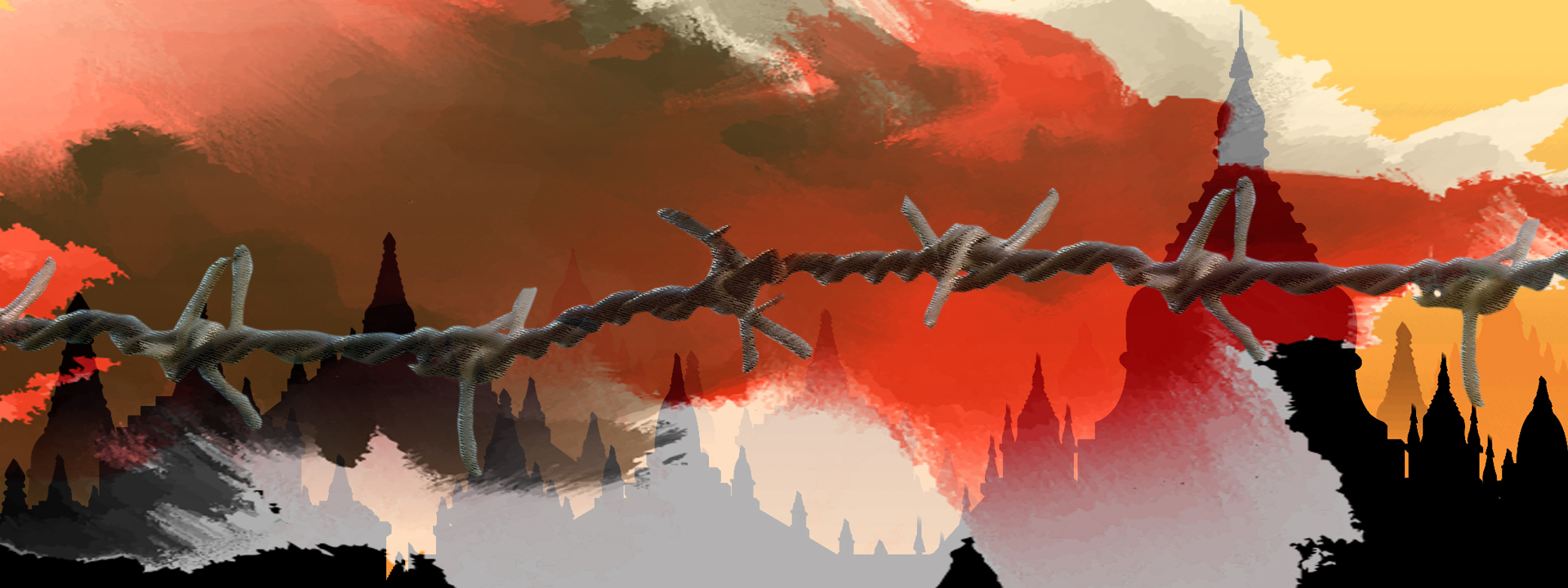The coup d’etat staged by the Tatmadaw — the armed forces of Myanmar — last 1st February has not only disrupted the fragile process of democratization there, but has also sent shockwaves across the Indo-Pacific region, which had beenincreasingly wary about the dynamics of the Sino-U.S. competition. Countries alarmed by China’s rising assertiveness are now worried that a post-coup Myanmar would be further isolated by the West, eventually pushing Naypyidaw into Beijing’s embrace.
Japan is no exception to such strategic thought, but its position is more complicated than that. As a staunch ally of the United States, which has already placed the whole junta on its list of those targeted for financial sanctions, Japan has been under enormous pressure to align with its security patron. To strike a delicate balance between China’s geopolitical challenges and America’s human-rights diplomacy, Japan has so far tread carefully on the Myanmar crisis: verbally condemning the military junta and the violence perpetrated by the security forces on the one hand, and exercising restraint from punishing the coup leaders substantially on the other. Japan’s decision-makers might perceive that this ambivalent attitude (or what I call the “dual approach”) would generate strategic autonomy for them to negotiate or bargain with the coup leaders. After all, it would be ill-advised for Tokyo to put all its bets on the generals, whose objectives are largely incompatible with the declared positions of the Japanese government.

Japan has so far tread carefully on the Myanmar crisis: verbally condemning the military junta and the violence perpetrated by the security forces on the one hand, and exercising restraint from punishing the coup leaders substantially on the other.
Japan’s dual approach in the Myanmar crisis
Compared with most of the countries in the region, regardless of their regime types, Japan by far has been one of the most critical voices against the Tatmadaw for causing excessive violence towards civilians and detaining the elected politicians from the National League of Democracy (NLD), as well as for damaging Myanmar’s hard-won democratic transition. In early June, both chambers of the Japanese Diet adopted resolutions condemning the Tatmadaw for staging the coup that “trampled on efforts and expectations of democratization,” and had urged the Japanese government to “make full use of all diplomatic resources for early restoration of the democratic system in Myanmar” and not recognize the junta as a legitimate representative of Myanmar people. Neither Singapore nor Indonesia — both members of the Association of Southeast Asian Nations (ASEAN) and which have been relatively outspoken about the Myanmar crisis — has ever directly named andshamed the Tatmadaw in the way Japan has done.
In different multilateral fora, Prime Minister Yoshihide Suga and his cabinet ministers have also displayed stern faces toward the junta leaders, condemning, as they recently did at the G-7 Summit on 12th June, “in the strongest terms the military coup in Myanmar.” It is remarkable that the Japanese government, currently led by the Liberal Democratic Party (LDP), has accepted the toughening narratives against the junta leaders, when the previous government — led by the same party — had abstained from UN resolutions that expressed concerns over the human-rights abuses against the Rohingya Muslim minority in Myanmar.
Japan’s rhetoric, however, has seldom been backed up by action or substance. For instance, Foreign Minister ToshimitsuMotegi announced in March that Japan would withhold new Official Development Assistance (ODA) to Myanmar. Yet Tokyohas since done little to introduce any additional punitive measure toward the junta, despite the surge of civilian casualties inMyanmar in the months that followed. In fact, after Japanese freelance journalist Yuki Kitazuni was arrested by the junta for supposedly spreading “fake news,” the Suga administration responded by merely mulling over the possibility of suspending ODAs to all projects, including existing ones. Until now, Japan is the only G-7 member not applying any targeted sanctions against either the coup leaders like Senior General Min Aung Hlaing, or the military-linked entities.
Being the largest aid provider to Myanmar (Japan’s aid amounted to US$1.74 billion in the fiscal year 2019), Japan has been facing strong expectations to sway the junta toward lessening (if not stopping) the use of violence, as well as releasing political prisoners and restoring democracy. But it remains doubtful that the changes in ODA disbursements, a majority of which were directed toward long-term infrastructure investments, could compel the Tatmadaw to make compromises over the most crucial and immediate concerns, i.e. the junta’s violent crackdowns on protesters and its jailing of NLD politicians. Suga’s commitment to human rights also seems dubious considering that three months after the coup, Japan’s state-run entities, not least the Japan Bank for International Cooperation (JBIC) and Japan Overseas Infrastructure Investment Corporation for Transport and Urban Development, were still involved in real-estate development projects financially benefiting the Tatmadaw.

Amid the post-coup violence in Myanmar, civilian protesters have appealed for support from the international community whose response has been mixed at best.
Logics behind Japan’s approach: the “special relationships”
In addition to the evolving geopolitical realities, Tokyo often attributes its less-coercive strategy to Japan’s “special relationship” with Myanmar. The narrative of “special relationship” can be traced back to the Second World War, when the Japanese Imperial Army trained the future Tatmadaw generals. The late Myanmar strongman Ne Win, who was among those who had received military training from Japan in wartime, granted Japanese ambassadors the privilege of direct access to him. These traditional ties, complemented by the proliferating “private” networks — as represented by the Japan Myanmar Association (headed by Hideo Watanabe, a former cabinet minister) — and influential policy advisors like Yohei Sasakawa, have enabled Japan to enjoy exclusive and multiple channels not available to other countries, including those in the West.
This narrative of “special relationship” has been so entrenched in the Suga administration that Foreign Minister Motegi even brought it up when he threatened to suspend all ODA to Myanmar. The notion has gained much popularity among the Japanese public as well. In an opinion survey conducted by Japan’s Ministry of Foreign Affairs in late March, 72 percent of the respondents agreed that Tokyo should use its unique channels to improve the conditions in Myanmar, again reflecting the deep-rooted Japanese perception of the “special relationship” between Japan and Myanmar.
For sure, Japan’s friendly approach to Myanmar had paid off in the past. Notably, before the coup, Yohei Sasakawa, Japan’s Special Envoy for national reconciliation in Myanmar, even managed to meet with Min Aung Hlaing and Aung San Suu Kyi in person, and was able to facilitate a ceasefire between one of Myanmar’s strongest ethnic armed organizations, the Arakan Army, and the Tatmadaw. Tokyo has thus endeavored to resist the pressure from the West to introduce coercive measures toward the coup leaders, as these would inevitably jeopardize the mutual trust and friendly relations between Japan and Myanmar.
“Quiet diplomacy” shouldn’t be an excuse for inaction
Yusuke Watanabe, the secretary general of the Japan Myanmar Association, recently argued in The Diplomat that Japan should demonstrate its “exemplary leadership” by continuing to pursue its special ties with the Tatmadaw by boosting economic cooperation, which would eventually lead to peace and democratization. But the current crisis in Myanmar is nowhere close to the pre-coup stability where Tokyo could exercise its diplomatic
influence with relative ease. On the contrary, with the formation of the National Unity Government (NUG), the parallel government, and its armed wings, the coup has developed into a full-blown, nationwide conflict not likely to end soon.

In the meantime, Min Aung Hlaing’s lukewarm responses to ASEAN’s “five-point consensus” implied that since it was not about recognizing the legitimate status of the military junta, he was not giving much priority over rebuilding ties with its closest neighbors. Yet while Japan in comparison boasts of having a greater variety of channels to engage Myanmar’s militaryleaders, it is unclear how these can persuade the Tatmadaw to tolerate dissidents and a rival political regime at home. Bound by its commitments towards domestic constituents and like-minded countries, Japan is arguably more circumscribed than ASEAN in managing ties with the security forces of Myanmar.
Then again, Japan could do more to mitigate the crisis without having to radically shift the trajectories of its Myanmar policy. While Tokyo resists imposing sanctions upon the Tatmadaw, it can be more proactive to engage the NUG through different pathways. The online conference in May between NUG representatives and the Japan Parliamentary Group Supporting Democratization in Myanmar was a good beginning. Looking forward, Japanese cabinet ministers should consider taking part in similar workshops — in private capacities initially — to reinforce warning signals to the Tatmadaw, i.e. Japan’s goodwill to the Tatmadaw is not unconditional and will fade away if the military doesn’t stop the violence.
Japan should also strengthen cooperation with ASEAN leaders to expedite the implementation of the “five-point consensus.” With multiple channels and access to the military, the Suga administration can synergize the ASEAN-led solution to facilitate the mediation process in Myanmar. If Japan wants to “lead by example,” it has to act more, and act quickly. ●
Kalvin Fung is a Ph.D. Candidate in the Graduate School of Asia-Pacific Studies at Waseda University.



















